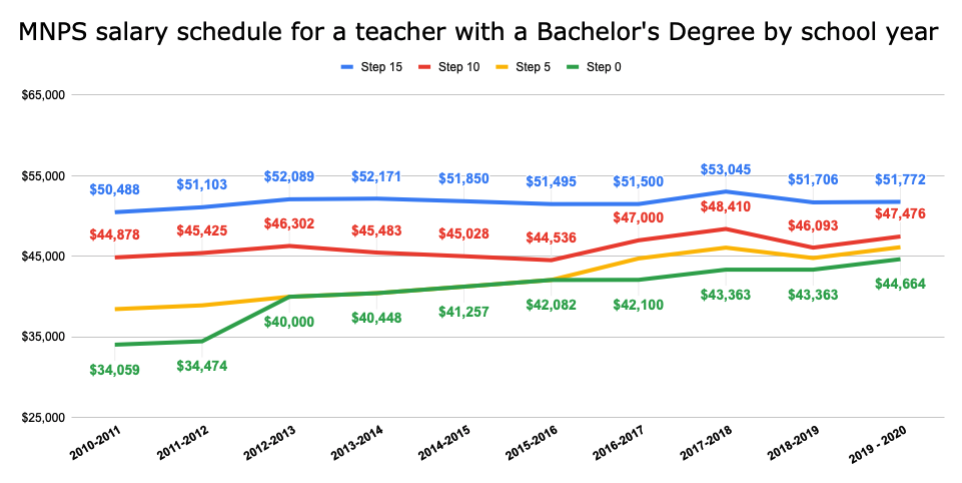Even as neighboring districts like Sumner County move to significantly increase teacher pay, teachers in Metro Nashville find their salaries stagnating.
Ben Hall of NewsChannel5 reports that a teacher in Metro with 15 years of experience actually earns LESS money today than a teacher with 15 years of experience earned back in 2012:
It’s hard to believe, but a Metro teacher with a Bachelor’s Degree and 15 years experience is paid less today than a teacher in that same position back in 2012. As you can see in the chart above, in 2012-2013 teachers on Step 15 made just over $52,089. Today, seven years later, Step 15 is valued at $51,772.

The problem of low teacher pay in Nashville is not new. In fact, in 2015, I reported on teacher pay in Nashville relative to peer districts and noted that at that time, starting pay was reasonably competitive, but pay for experienced teachers lagged behind:
Just three hours north of Nashville in a city with similar demographics and cost of living, a teacher can earn significantly better pay over a career. While a teacher in Louisville starts out making slightly less than a new Nashville teacher, by year 10, the Louisville teacher makes $9,000 more than her Nashville counterpart and by year 20, that difference stretches to $15,000. The lifetime earnings of a teacher in Louisville significantly outpace those of a teacher in Nashville.
In 2017, I updated this analysis with a comparison to Louisville:
A Nashville teacher with a bachelor’s degree and 20 years experience makes $56,000. In Louisville, that teacher makes $71,000. A teacher working in Louisville with 20 years experience earns $22,000 more a year than that city’s “comfortable living” salary. In fact, they earn more than Nashville’s “comfortable” salary.
How about the top of the pay scale? At year 25, a Nashville teacher earns $57,000. In Louisville, it’s just over $72,000.
Some may note that teachers often earn advance degrees over the course of their career and that boosts pay. That’s true. So, a teacher with a master’s degree working in Nashville earns $62,600 at the top of the scale. In Louisville, it’s $78,000.
Imagine working for 25 years in the same profession, earning an advanced degree in your field, and making $7000 less than the “comfortable living” salary for your city? That’s what’s happening in MNPS.
In short, teacher pay in Nashville has been an “area of concern” for years now. So far, little has been done to address it. Yes, the state should absolutely put forward its fair share — though Bill Lee wants that money spent on vouchers. But, Nashville has the resources to significantly boost teacher pay. That the city has chosen not to should tell you all you need to know about the priorities of those in power.

For more on education politics and policy in Tennessee, follow @TNEdReport
Your support — $3 or more today — helps make reporting education news possible.